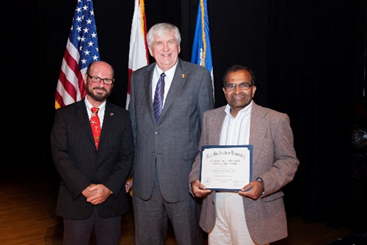Hybrid Antibacterial Agents
Grant Winners
- Venkatesh Shanbhag. Ph.D. – Halmos College of Oceanography and Natural Sciences
- Akshay Naraine, B.S. – Halmos College of Oceanography and Natural Sciences
- Alissa Svedberg, B.S. – Halmos College of Oceanography and Natural Sciences
- Zach Galloway, B.S.
Dean
- Richard Dodge, Ph.D. – Halmos College of Oceanography and Natural Sciences
Abstract

We are currently witnessing a dramatic and alarming increase in the incidence of bacterial infections resistant to most common antibiotics. This may also be attributed to the overuse of antibiotics. The problem of multidrug resistant microorganisms has reached alarming levels. Infections caused by these microorganisms pose a serious challenge to the medical community and the need for an effective therapy has led to an urgent search for novel antimicrobial agents. However, it takes much time and high cost to issue a new antibiotic. Scientists have been exploring multi-prong approach for drug design. A hybrid drug concept is one such innovation which comprises of incorporation of two drug pharmacophores in one single molecule. This strategy is basically designed to generate molecules with multiple targets or to amplify its effect through action on another bio target.
It is known that chalcones and pyrazolines possess antibacterial and antifungal activity. With this in mind, the overall goal of this project is development and synthesis of novel hybrid antibacterial agents containing these two groups and test their activities against bacteria. The antibiotic activity will be analyzed by the standard Kirby-Bauer disk diffusion assay technique. Representative members of Gram (+) bacteria and Gram (-) bacteria will be employed in the study. These include, but are not limited to, E. Coli, S. Aureus, Salmonella, P. aeruginosa, and S. pyogene. Based on the success, we will explore the study of minimum inhibitory concentration (MIC) to ascertain the effectiveness. The findings of the research will be used for presentations at regional and national conferences and for the development of publication manuscripts. The undergraduate students of FCAS will be trained with sophisticated multistep organic synthesis, chemical characterization, biological assay techniques as well as presentation of scientific research to the community.